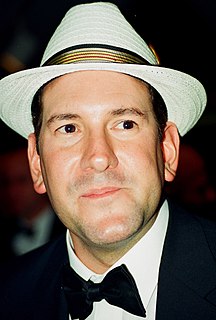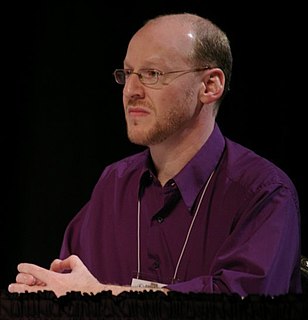Top 370 Adapted Quotes & Sayings - Page 6
Explore popular Adapted quotes.
Last updated on April 20, 2025.
The basic formulation, or bare-bones mechanics, of natural selection is a disarmingly simple argument, based on three undeniable facts (overproduction of offspring, variation, and heritability) and one syllogistic inference (natural selection, or the claim that organisms enjoying differential reproductive success will, on average, be those variants that are fortuitously better adapted to changing local environments, and that these variants will then pass their favored traits to offspring by inheritance).
All our surest statements about the nature of the world are mathematical statements, yet we do not know what mathematics "is"... and so we find that we have adapted a religion strikingly similar to many traditional faiths. Change "mathematics" to "God" and little else might seem to change. The problem of human contact with some spiritual realm, of timelessness, of our inability to capture all with language and symbol-all have their counterparts in the quest for the nature of Platonic mathematics.
Our minds are specifically adapted to developing certain theories, and we have a science if the theories that are available to our minds happen to be close to true. Well, there is no particular reason to suppose that the intersection of true theories and theories that are accessible to the mind is very large. It may not be very large.
I have a very clear perception what the Internet is in my mind. I'm free. I'm not defined by what they say is the Internet is. Meaning Goldman Sachs, meaning who they invest in for the latest start-up, meaning the latest Buzzfeed, or Salon, or Gawker. Well, Gawker's more independent. But, there's a lot of corporate makeover of the Internet that I have not adapted to, simply put. I'm friends with some of them. When I go to New York I make the 6th Avenue rounds, but I am not a part of that system.
Eurasia's main axis is east/west, whereas the main axis of the Americas is north/south. Eurasia's east/west axis meant that species domesticated in one part of Eurasia could easily spread thousands of miles at the same latitude, encountering the same day-length and climate to which they were already adapted.
The goodness or badness, justice or injustice, of laws varies of necessity with the constitution of states. This, however, is clear, that the laws must be adapted to the constitutions. But if so, true forms of government will of necessity have just laws, and perverted forms of government will have unjust laws.
Humanity is a biological species, living in a biological environment, because like all species, we are exquisitely adapted in everything: from our behavior, to our genetics, to our physiology, to that particular environment in which we live. The earth is our home. Unless we preserve the rest of life, as a sacred duty, we will be endangering ourselves by destroying the home in which we evolved, and on which we completely depend.
Not only are we harried by time, we seem unable, despite a thousand generations, even to get used to it. We are always amazed at it–how fast it goes, how slowly it goes, how much of it is gone. Where, we cry, has the time gone? We aren’t adapted to it, not at home in it. If that is so, it may appear as a proof, or at least a powerful suggestion, that eternity exists and is our home.
The strengths landscape architecture draws from its garden design heritage include: the Vitruvian design tradition of balancing utility, firmness and beauty; use of the word 'landscape' to mean 'a good place' - as the objective of the design process; a comprehensive approach to open space planning involving city parks, greenways and nature outside towns; a planning theory about the contextualisation of development projects; the principle that development plans should be adapted to their landscape context.
Antique art has come down to us in a fragmentary condition, and we have virtuously adapted our taste to this necessity. Almost all our favorite specimens of Greek sculpture, from the sixth century onward, were originally parts of compositions, and if we were faced with the complete group in which the Charioteer of Delphi was once a subsidiary figure, we might well experience a moment of revulsion. We have come to think of the fragment as more vivid, more concentrated, and more authentic.
Astrology ... makes vague predictions that can always be adapted after the fact to fit observations, as we'll see. Astrologers don't seek causes at all, for a good reason: There isn't any cause to astrology. If you look for some underlying reason, some connection between the stars and planets and our lives, you won't find any. For astrology to sell, buyers must not seek out the fundamental principles behind it, because if they do they'll see that there is none.
As soon as somebody demonstrates the art of flying, settlers from our species of man will not be lacking on the Moon and Jupiter. Who would have believed that a huge ocean could be crossed more peacefully and safely than the the narrow expanse of the Adriatic, the Baltic Sea or the English Channel? Given ships or sails adapted to the breezes of heaven, there will be those who will not shrink from even that vast expanse.
Henri-Georges Clouzot's cool, clammy, twisty 1955 thriller Diabolique is an almost perfect movie about a very nearly perfect murder, a film in which the artist's methods and the killers' are ideally matched, equal in cunning and in ruthlessness. The screenplay, adapted by Clouzot and three other writers from a novel by the crack French crime-fiction team of Pierre Boileau and Thomas Narcejac, is a fantastically elaborate piece of contrivance, but the scrupulous realism of the direction makes the unnatural tale somehow feel entirely likely.
The very comprehensibility of the world points to an intelligence behind the world. Indeed, science would be impossible if our intelligence were not adapted to the intelligibility of the world. The match between our intelligence and the intelligibility of the world is no accident. Nor can it properly be attributed to natural selection, which places a premium on survival and reproduction and has no stake in truth or conscious thought. Indeed, meat-puppet robots are just fine as the output of a Darwinian evolutionary process.
it is only on posters and in advertisement pages that Americans have those chubby cheeks, expanding smiles, smooth looks, and faces flushed with well-being. In fact, almost all are at odds with themselves; drink offers a remedy for this inner malady of which boredom is the most usual sign: as drinking is accepted by society, it does not appear as a sign of their [Americans'] inability to adapt themselves; it is rather the adapted form of inadaptability.
A natural talent is required; for, when Nature opposes, everything else is in vain; but when Nature leads the way to what is most excellent, instruction in the art takes place, which the student must try to appropriate to himself by reflection, becoming an early pupil in a place well adapted for instruction. He must also bring to the task a love of labor and perseverance, so that the instruction taking root may bring forth proper and abundant fruits.
From whence it is obvious to conclude that, since our Faculties are not fitted to penetrate into the internal Fabrick and real Essences of Bodies; but yet plainly discover to us the Being of a GOD, and the Knowledge of our selves, enough to lead us into a full and clear discovery of our Duty, and great Concernment, it will become us, as rational Creatures, to imploy those Faculties we have about what they are most adapted to, and follow the direction of Nature, where it seems to point us out the way.
The systems of stereotypes may be the core of our personal tradition, the defenses of our position in society. They are an ordered more or less consistent picture of the world, to which our habits, our tastes, our capacities, our comforts and our hopes have adjusted themselves. They may not be a complete picture of the world, but they are a picture of a possible world to which we are adapted. In that world, people and things have their well-known places, and do certain expected things. We feel at home there. We fit in. We are members.
The church must seek to be biblical rather than relevant. We are not going to leave a mark upon our culture because we have studied its ways and adapted ourselves to it. We are relevant when we reject the world outright and are its polar opposite! This present darkness provides a great opportunity for the church to be the salt of the earth, but if we mix with the very impurities we are supposed to expose... we are as useless as our culture already believes us to be.
Hey, what is it with you? Why are you so spaced out? You still haven't answered me." I probably still haven't completely adapted to the world," I said after giving it some thought. "I don't know, I feel like this isn't the real world. The people, the scene: they just don't seem real to me." Midori rested an elbow on the bar and looked at me. "There was something like that in a Jim Morrison song, I'm pretty sure." People are strange when you're a stranger.
The metaphor I routinely use is polar bears in the Sahara desert. You take creatures adapted to the cold and put them in the heat, the very traits that allow them to survive in one environment will conspire against them in the other. We are polar bears in the Sahara with one important distinction: we are smarter than the average bear. Once we identify the nature of the problem, we can think our way out of it. But it begins by acknowledging you didn't fail because you couldn't succeed. Because you didn't even know what the scope of the problem was. It's not your fault.
I had studied Dadaism after the Second World War. What attracted me to this movement was the style its inventors used when not engaged in Dadaistic activities. It was clear, luminous, simple without being banal, precise without being narrow; it was a style adapted to the expression of thought as well as of emotion. I connected this style with the Dadaistic exercises themselves
Sundry manifestations of nature in men and women, are greatly perverted by existing social conventions upheld by both. There are feelings which, under our predatory régime, with its adapted standard of propriety, it is not considered manly to show; but which, contrariwise, are considered admirable in women. Hence repressed manifestations in the one case, and exaggerated manifestations in the other; leading to mistaken estimates.
Of possible quadruple algebras the one that had seemed to him by far the most beautiful and remarkable was practically identical with quaternions, and that he thought it most interesting that a calculus which so strongly appealed to the human mind by its intrinsic beauty and symmetry should prove to be especially adapted to the study of natural phenomena. The mind of man and that of Nature's God must work in the same channels.
Man is but mortal: and there is a point beyond which human courage cannot extend. Mr. Pickwick gazed through his spectacles for an instant on the advancing mass, and then fairly turned his back and-we will not say fled; firstly, because it is an ignoble term, and, secondly, because Mr. Pickwick's figure was by no means adapted for that mode of retreat-he trotted away, at as quick a rate as his legs would convey him;.
It is not true that a man can believe or disbelieve what he will. But it is certain that an active desire to find any proposition true will unconsciously tend to that result by dismissing importunate suggestions which run counter to the belief, and welcoming those which favor it. The psychological law, that we only see what interests us, and only assimilate what is adapted to our condition, causes the mind to select its evidence.
Enclosed within his artificial creation, man finds that there is “no exit”; that he cannot pierce the shell of technology again to find the ancient milieu to which he was adapted for hundreds of thousands of years . In our cities there is no more day or night or heat or cold. But there is overpopulation, thralldom to press and television, total absence of purpose. All men are constrained by means external to them to ends equally external. The further the technical mechanism develops that allows us to escape natural necessity, the more we are subjected to artificial technical necessities.
Well, gentlemen, do you believe in the possibility of aerial locomotion by machines heavier than air? ... You ask yourselves doubtless if this apparatus, so marvellously adapted for aerial locomotion, is susceptible of receiving greater speed. It is not worth while to conquer space if we cannot devour it. I wanted the air to be a solid support to me, and it is. I saw that to struggle against the wind I must be stronger than the wind, and I am.
There can be no religious discourse which is in conflict with its environment and with the world and therefore, we Muslims need to modify this religious discourse. And this has nothing to do with conviction and with religious beliefs, because those are immutable. But we need a new discourse that will be adapted to a new world and which will remove some of the misconceptions.
Nothing we do in this great capital can change the fact that factories or information can flash across the world, that people can move money around in the blink of an eye... Nothing can change the fact that technology can be adopted, once created, by people all across the world and then rapidly adapted in new and different ways by people who have a little different take on the way that technology works.
Christianity is most admirably adapted to the training of slaves, to the perpetuation of a slave society; in short, to the very conditions confronting us today. The rulers of the earth have realized long ago what potent poison inheres in the Christian religion. That is the reason they foster it; that is why they leave nothing undone to instill it into the blood of the people. They know only too well that the subtleness of the Christian teachings is a more powerful protection against rebellion and discontent than the club or the gun.
Women, I learned, adapted.
At first..they seemed so fragile, so dependent on fathers and husbands and brothers and lovers. Gradually, though, I noticed how supple their lives were beneath the surface. Then I realized it was this flexibility that enabled them to survive...that sooner or later, by choice or by chance, most women faced the task of adapting to a future on their own. When at my most optimistic, I thought of it as independence; in darker moods, as survival. Either way women had to do it.
Nature is a hanging judge," goes an old saying. Many tragedies come from our physical and cognitive makeup. Our bodies are extraordinarily improbable arrangements of matter, with many ways for things to go wrong and only a few ways for things to go right. We are certain to die, and smart enough to know it. Our minds are adapted to a world that no longer exists, prone to misunderstandings correctable only by arduous education, and condemned to perplexity about the deepest questions we can ascertain.
At last gleams of light have come, and I am almost convinced (quite contrary to opinion I started with) that species are not (it is like confessing a murder) immutable. Heaven forfend me from Lamarck nonsense of a 'tendency to progression', 'adaptations from the slow willing of animals', &c! But the conclusions I am led to are not widely different from his; though the means of change are wholly so. I think I have found out (here's presumption!) the simple way by which species become exquisitely adapted to various ends.
Independently of the curious circumstance that such tales should be found existing in very different countries and languages, which augurs a greater poverty of human invention than we would have expected, there is also a sort of wild fairy interest in them, which makes me think them fully better adapted to awaken the imagination and soften the heart of childhood than the good-boy stories which have been in later years composed for them.
Normal children of both sexes and all cultures will follow a more or less standard and universal developmental pattern and timetable, and reach approximately the same level of development at maturity. While a particular culture's need and expectations and teaching will shape the course of development and affect adult capabilities to some degree, normal individuals, whatever their native culture, if transplanted and taught, could learn to meet the normal demands of their adapted cultures.
Human existence may be simpler than we thought. There is no predestination, no unfathomed mystery of life. Demons and gods do not vie for our allegiance. Instead, we are self-made, independent, alone, and fragile, a biological species adapted to live in a biological world. What counts for long-term survival is intelligent self-understanding, based upon a greater independence of thought than that tolerated today even in our most advanced democratic societies.
Every physical fact, every expression of nature, every feature of the earth, the work of any and all of those agents which make the face of the world what it is, and as we see it, is interesting and instructive. Until we get hold of a group of physical facts, we do not know what practical bearings they may have, though right-minded men know that they contain many precious jewels, which science, or the expert hand of philosophy will not fail top bring out, polished, and bright, and beautifully adapted to man's purposes.
Our world is not an optimal place, fine tuned by omnipotent forces of selection. It is a quirky mass of imperfections, working well enough (often admirably); a jury-rigged set of adaptations built of curious parts made available by past histories in different contexts. A world optimally adapted to current environments is a world without history, and a world without history might have been created as we find it. History matters; it confounds perfection and proves that current life transformed its own past.
I used to hate the urban environment and the urban din. But I realize now that it's really not that much different than living next to a waterfall for wildlife. Most wildlife - unless they're specifically adapted - avoid being around a waterfall or whitewater streams and rivers because it jams their sense of surveillance. They are more vulnerable, and their message loses intelligibility. Now, the ouzel is able to overcome that in various ways. Back to the urban environment, we're talking and delivering messages as if we weren't next to a waterfall, and that's a problem.
That this subject [of imaginary magnitudes] has hitherto been considered from the wrong point of view and surrounded by a mysterious obscurity, is to be attributed largely to an ill-adapted notation. If, for example, +1, -1, and the square root of -1 had been called direct, inverse and lateral units, instead of positive, negative and imaginary (or even impossible), such an obscurity would have been out of the question.
I’ve always wanted to be liked. It grieved me that I was treated with indifference. Left an orphan by Fortune, I wanted—like all orphans—to be the object of someone’s affection. This need has always been a hunger that went unsatisfied, and so thoroughly have I adapted to this inevitable hunger that I sometimes wonder if I really feel the need to eat. Whatever be the case, life pains me.
The present era grabs everything that was ever written in order to transform it into films, TV programs; or cartoons. What is essential in a novel is precisely what can only be expressed in a novel, and so every adaptation contains nothing but the non-essential. If a person is still crazy enough to write novels nowadays and wants to protect them, he has to write them in such a way that they cannot be adapted, in other words, in such a way that they cannot be retold.
I've had stuff of mine adapted by other people, so I've come to the conclusion that a movie is a different form from a novel and there is no such thing as a true adaptation. You have to adapt to this other thing and do it right. But that voice of the original should somehow still be there, and the original intent should still be there. So if the original writer saw the movie, the writer would say, "Well, that's not what I wrote, but that's what I meant." And if you can do that, I think you've done your job as a screenwriter.
I think the books are the books. They were conceived as books. They weren't conceived as movies. When I write scripts, that's an idea and a situation that I think is a really good idea for a movie. When I'm writing a book, I'm not thinking, "Oh, this would be a great movie." This would be a very interesting book. And I think the books are things that cannot really be adapted into another medium.
At a certain point in history monuments became associated with kitsch, (it had never previously been so) and one might well ask why this unforeseen aesthetic and ethnic debasement of their values came about, or why monuments have not adapted to the times. Perhaps, instead of evoking authentic religious, patriotic or mystical sentiments, they evoke only the customary ersatz for these sentiments and have suffered the fate of becoming sentimental.
That which is wrong under one circumstance, may be, and often is, right under another. God said, 'Thou shalt not kill'; at another time He said, 'Thou shalt utterly destroy.' This is the principle on which the government of heaven is conducted—by revelation adapted to the circumstances in which the children of the kingdom are placed. Whatever God requires is right, no matter what it is, although we may not see the reason thereof till long after the events transpire.
From a human point of view, the difference between the mind of a human and that of a mountain goat is wonderful; from the point of view of the infinite ignorance that surrounds us, the difference is not impressive. Indeed, from that point of view, the goat may have the better mind, for he is more congenially adapted to his place, and he would not endanger his species or his planet for the sake of an idea.
I was repelled by the sleazy reality of the totalitarian countries: politicians were shameless. There were corruption, pollution, shoddy goods, long lines, and suicide everywhere, but the leaders kept boasting about their great achievements and bright tomorrows. I saw all this and tried to show it in my pictures as simply and straightforwardly as I could. All I wanted to do was record how all these poor people adapted to lies and suffering, how they got used to it, how, in fact they were bound to miss it when it was over.
If to enjoy even an enjoyable present we must have the assurance of a happy future, we are “crying for the moon.” We have no such assurance. The best predictions are still matters of probability rather than certainty, and to the best of our knowledge every one of us is going to suffer and die. If, then, we cannot live happily without an assured future, we are certainly not adapted to living in a finite world where, despite the best plans, accidents will happen, and where death comes at the end.
We have all been hypnotized into thinking that we are smaller than we are. Just as an undersized flowerpot keeps a mighty tree root-bound or a little fishbowl keeps goldfish tiny, we have adapted, adjusted, and accommodated to a Lilliputian life. But place the same tree in an open field or the fish in a lake, and they will grow to hundreds of times their size. Unlike the tree or goldfish, you are not dependent on someone else to move you. You have the power to move yourself. You can step into a broader domain and grow to your full potential.
As far as life is concerned, there is no such thing as "Nature". There are only homes. Home is that environment to which the individual has become adapted; and almost everything is unnatural outside his range of adaptation. Harmonious equilibrium with nature is an abstract concept with a Platonic beauty but lacking the flesh and blood of life. It fails, in particular, to convey the creative emergent quality of human existence.
We finally know where the red line for climate really is. After the rapid melt of arctic ice in the summer of 2007, our best scientists, led by NASA's Jim Hansen, went back to work and produced a series of papers showing that with more than 350 ppm (parts per million) of carbon dioxide in the atmosphere, we couldn't have a planet "similar to the one on which civilization developed and to which life on earth is adapted."
How fleeting are the wishes and efforts of man! how short his time! and consequently how poor will his products be, compared with those accumulated by nature during whole geological periods. Can we wonder, then, that nature's productions should be far 'truer' in character than man's productions; that they should be infinitely better adapted to the most complex conditions of life, and should plainly bear the stamp of far higher workmanship?
I don't think that people are necessarily going to films simply because they were adapted from comics, though I could be wrong. Comics aren't really misunderstood either, they've just been mostly silly for the past century, and those genre-centered stories have found their way into the movie theaters over the past couple of decades because a generation who grew up reading them has, well, grown up.
I'm not as religious as some people about "the album." To be honest, that was a product of a format. You had vinyl, and you could fit five songs on each side, and that's 45 minutes. You had A-side songs and B-side songs; I always loved the first song on side B. And there's nothing wrong with that. Prog albums of the 70s adapted to that format very much. But not all musicians want to create 45 minutes of music that has to be listened to in chronological order.
























































